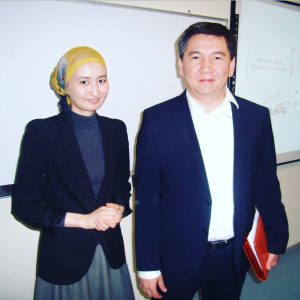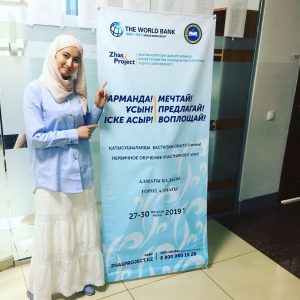Online school to help foster parents
Recently we interviewed Akmaral Shalgimbayeva – a graduate of Nazarbayev University’s Graduate School of Education, specializing in “Master of Science in Leadership in Education” – about her social project of an online school for foster parents.
Akmaral, how did studying at Nazarbayev University affect your professional life?
I always wanted to deal with social problems and be as useful to society as possible, so I tried to get involved in various social projects. Perhaps that’s why I chose to study and work in the field of education. While studying at the university, I learned about the specifics of educational reforms in Kazakhstan and Central Asia and studied the most effective models of educational programs in the world. After graduating from my master’s degree in 2015, I aimed to put my knowledge into practice. I taught at the Kazakh National University in Almaty and also volunteered in orphanages.
What projects are you working on now?
Working as a volunteer in orphanages, I have often seen that foster parents after the adoption of children faced various difficulties in life, ranging from legal subtleties of the adoption process to issues of education, leisure time, etc. Meanwhile, there are many parents who have already successfully dealt with these difficulties and could share their experience with others. There are also a number of competent experts who can provide good advice for foster parents on how to solve certain issues and problems. Therefore, I had an idea to open an online school for foster parents. Although there are already existing resources for exchange of experience in this area, we saw two potential places to improve. We wanted to be online because useful information needs be available to all parents, no matter where in Kazakhstan they are. Many of the existing online resources are heavily text-focused and we wanted to provide a platform with more video content. The main goal of our project is to help foster parents to give their children, who were left without parents, a family, warmth, to bring them up as worthy people, to give them a good education.
Initially, my work on this project began with participation in the Zhas Project contest. I learned about it last year and immediately applied to participate in it, and then successfully passed the competition, having the opportunity to develop and implement this project in practice.
The Zhas Project- project is a joint project of the International Bank for Reconstruction and Development and the Ministry of Education and Science of the Republic of Kazakhstan. It has a very noble and popular goal – to involve young people in the life of society, to develop their vital skills through a training program for the benefit of the community. It includes four main components: provision of grants and scholarships for social projects; training of young people in life skills development and project management; work with vulnerable youth groups; implementation of an effective advocacy campaign, feedback system and problem-solving mechanism.
As part of our participation in the project, we have undergone a very interesting and informative three-step training in life skills and project management. Having completed the training, we were able to start implementing our own social projects.
What assistance do you plan to provide to foster parents in the online school?
As you know, raising children is not an easy thing, and the upbringing of foster children and has many specific nuances and difficulties. Therefore, in the online school we will try to give parents not only the theoretical foundations related to the psychology of education, but also share practical and real-life cases from families with foster children. More specifically, we plan to consider such topics as motivation to become foster parents, the different developmental stages of children, how character, personality, and self-esteem develop at different ages, integration and bonding between members of the family, and what parents need to know about the foster child and others.
As for the experts involved in our project, I can name, for example, Raushan Karimova, Doctor of Psychology, professor and head of the scientific and technical laboratory of the Abai Kazakh National Pedagogical University. She has extensive experience in working with teenagers and has written extensively on topics and methodology related to childhood development and education. We also involve Tuyak Eskozhina, a foster parent and director of the Nur Family Children’s Home, in the project. She and her husband have raised about 800 orphans to adulthood over the past 20 years.
We plan to launch this project by September this year on a special website and on Youtube. The course will be absolutely free for all students, who can be potential or current foster parents, as well as anyone who wants to improve their level of literacy in the field of psychology of children.
Our task is to make potential adoptive parents aware of the importance and seriousness of the issue of adoption, because we believe that every parent should know about the possible difficulties and nuances before reaching out to a single child and changing his or her fate. It is clear that it is impossible to convey all knowledge about the psychology of children, each case is certainly individual and different from others, but we can try to give certain recommendations and some pedagogical techniques.
I know that today Nazarbayev University already has a number of social projects initiated by students, and this fact makes me very happy as a graduate of this university. I am sure that in the future our graduates will continue to develop this direction and bring benefit to Kazakhstani society.





